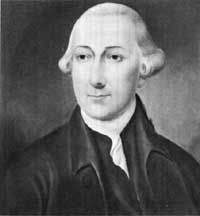Joseph Hewes
Joseph Hewes (* 23. January 1730 in Princeton , Province of New Jersey ; † 10. November 1779 in Philadelphia , Pennsylvania ) signed for North Carolina the United States Declaration of Independence , making it one of America's founding fathers .
Life
Hewe's parents were Quakers . He graduated from Princeton University and was an apprentice to a dealer after college. After his apprenticeship, he made a name for himself, which led to him becoming one of the most famous signers of the Declaration of Independence. After a few years as a trader, he got very rich. Hewes moved to North Carolina at the age of 30 and won over the people of that state with its charm and honorable business conduct. Hewes was elected to the North Carolina legislature in 1763, just three years after moving to the state. According to the delegates from Massachusetts, Hewes was an independence pioneer who influenced his state in such a way that it was very rebellious in the years before the American independence movement . After being re-elected to the legislative assembly many times, Hewes focused on new and more important work as a Congressman.
American independence
In 1773, the majority in North Carolina was in favor of independence. In 1774 it elected Hewes as its representative in the First Continental Congress . The people of North Carolina considered him their best representative because of his activities for independence, which the people of the other colonies also sought. Although the inhabitants of the colonies wanted independence, it was very difficult for Hewes to express his opinion in the Continental Congress without being laughed at or insulted. Even in the year the American War of Independence broke out, more than two-thirds of Congress delegates believed the bond between Britain's King George III. and the colonies could endure. Hewes rarely had the opportunity to speak in Congress because it was usually interrupted by those who disagreed with him. Even so, he was active on many committees, most of which favored independence. One of the ideas that Hewes brought into these committees was the following statement: "Record the rights of the colonies in general, the different cases in which those rights are violated or violated, and the best ways to restore them."
Quakers are traditionally pacifists . Ironically, not only was Hewes one of the few to favor a war against the Kingdom of Great Britain, he was also one of the few Quakers in Congress. The Quakers were not only against the war, but also against the committees that campaigned for the war. Hewes had to sever ties with the Quakers because of opposing views, the only family he had ever known.
politics
In early 1776, Hewes was appointed the first Minister of the Navy . John Adams often said that Hewes "laid the foundations and cornerstones for the American Navy." Alongside General George Washington , Hewes became one of the greats in American military history. He was also involved in the secret committee that promoted the independence of the colonies. Hewes was one of the main reasons North Carolina demanded independence over all other colonies. Without him, the declaration of independence would never have been signed.
After signing the Declaration of Independence, Hewes withdrew to his home in New Jersey because of his deteriorating health . Despite his health problems, he ran for re-election to Congress, but lost. In 1779 he served his final months as a congressman. He died on November 10th of that year, before he turned 50. All the congressmen came to his funeral the following day and mourned the great loss the country had suffered. Hewes kept a diary during the last years of his life. Before he died he wrote that he was a sad and lonely man who never wanted to be a bachelor. The girl he loved died before their wedding and he had never married and had no children to leave his money and possessions to.
While Hewes did not have the opportunity to see the former colonies fully recognized as the United States, he is viewed as something of a Moses of the time when he led the nation to independence but never saw the day when the land was free. Few consider Hewes an important figure in the creation of the nation or associate him with his many achievements. However, Hewes was undoubtedly one of the most important people of the time and a true independence fighter.
Web links
- Joseph Hewes , biography at The Society of the Descendants of the Signers of the Declaration of Independence
- Joseph Hewes in the database of Find a Grave (English)
- Joseph Hewes in the Biographical Directory of the United States Congress (English)
| personal data | |
|---|---|
| SURNAME | Hewes, Joseph |
| BRIEF DESCRIPTION | Signatory of the United States Declaration of Independence for North Carolina |
| DATE OF BIRTH | January 23, 1730 |
| PLACE OF BIRTH | Princeton , Province of New Jersey, United Kingdom |
| DATE OF DEATH | November 10, 1779 |
| Place of death | Philadelphia , Pennsylvania, United States |
